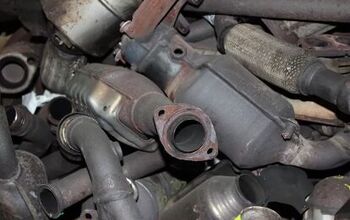Nine States Investigate GM Ignition Switch Recall
In today’s General Motors digest: Nine states are investigating the handling of the automaker’s ignition switch recall; compensation will only focus on those injured or killed; a Georgia injury claim’s transfer to New York a sign of things to come for similar claims; and a federal official saw GM’s corporate culture at work during bankruptcy proceedings, yet remained silent.
Bloomberg reports attorneys general in Arkansas, Connecticut, Florida, Illinois, Indiana, Iowa, Kentucky, Louisiana and Utah are all leading investigations into the February 2014 GM ignition switch recall in an effort address concerns among their constituents over their affected vehicles. Unlike the federal prosecutors in New York — who are conducting their own investigation into the recall — the attorneys general are able to make decisions faster, former Maine Attorney General Jim Tierney citing individuality as the key to quick decisions. As for potential fraud and negligence allegations, Tierney expects those questions will be answered “down the road,” the main focus of the AGs being to let GM know “they’re on the case and they’re paying attention.”
Within GM, The Detroit News says on the same day CEO Mary Barra announced she and independent investigator Anton Valukas would be heading up to Capitol Hill for a promised return to Congress, victim-compensation expert Kenneth Feinberg clarified that the fund he is designing for GM will only pay those affected by injury or death as a result of the recalled out-of-spec ignition switch found in 2.6 million vehicles; the switch is currently linked to 13 fatalities and 54 accidents. Though he has yet to determine the specifics on those to be compensated, Feinberg “will not include economic loss claims for e.g. ‘perceived diminished value.'” Those who are suing for such claims — over 70 plaintiffs — will instead meet before U.S. District Judge Jesse Furman in New York, where the automaker hopes the liability shield established upon exit from bankruptcy in 2009 will prevent those cases from moving further.
Speaking of New York, Bloomberg adds the injury lawsuit filed by Georgia attorney Lance Cooper and Alabama lawyer Jere Beasley on behalf of the family of Brooke Melton — who originally settled with GM last September prior to the recall — will likely join the economic value-related suits in New York instead of being considered for compensation. GM representative Kevin Kelly stated that any injury claim, no matter the timing, “would be subject to [Kenneth] Feinberg and the protocol he outlines,” though the automaker’s decision regarding the Melton case is, as far as it’s concerned, already settled. The Melton family is suing for damages beyond the federal minimum of $75,000, including “the full value” of their daughter’s life and funeral costs.
Finally, Automotive News reports a New York Times op-ed penned by Steven Rattner, who led the federal financial bailout of GM and Chrysler, recounted the first-hand knowledge of GM’s corporate culture at work in 2009. Rattner’s experience with the culture was as follows:
Looking under the hood of GM was the most stunningly disappointing dissection of a paid-up member of corporate America in my 30-year Wall Street career.
However, while he believed then-CEO Rick Wagoner left a lot to be desired on the corporate responsibility front — in comparison with Ford CEO Alan Mullaly — Rattner did not believe the overall senior management was at-fault for the ignition switch whose problems were years away from exploding into the spotlight.
Two safety advocates took issue with the op-ed: Care for Crash Victims auto safety research Louis Lombardo questioned Rattner’s decision to report on the culture, yet not investigate further into GM or the National Highway Traffic Safety Administration beyond the bottom line; and former agency head Joan Claybrook stated his account as lacking clarity, “encouraging [GM] to have a wink, a nod and a salute” over liability concerns.
Seattle-based writer, blogger, and photographer for many a publication. Born in Louisville. Raised in Kansas. Where I lay my head is home.
More by Cameron Aubernon
Latest Car Reviews
Read moreLatest Product Reviews
Read moreRecent Comments
- Dwford I don't think price is the real issue. Plenty of people buy $40-50k gas vehicles every year. It's the functionality. People are worried about range and the ability to easily and quickly recharge. Also, if you want to buy an EV these days, you are mostly limited to midsize 5 passenger crossovers. How about some body style variety??
- SCE to AUX The nose went from terrible to weird.
- Chris P Bacon I'm not a fan of either, but if I had to choose, it would be the RAV. It's built for the long run with a NA engine and an 8 speed transmission. The Honda with a turbo and CVT might still last as long, but maintenance is going to cost more to get to 200000 miles for sure. The Honda is built for the first owner to lease and give back in 36 months. The Toyota is built to own and pass down.
- Dwford Ford's management change their plans like they change their underwear. Where were all the prototypes of the larger EVs that were supposed to come out next year? Or for the next gen EV truck? Nowhere to be seen. Now those vaporware models are on the back burner to pursue cheaper models. Yeah, ok.
- Wjtinfwb My comment about "missing the mark" was directed at, of the mentioned cars, none created huge demand or excitement once they were introduced. All three had some cool aspects; Thunderbird was pretty good exterior, let down by the Lincoln LS dash and the fairly weak 3.9L V8 at launch. The Prowler was super cool and unique, only the little nerf bumpers spoiled the exterior and of course the V6 was a huge letdown. SSR had the beans, but in my opinion was spoiled by the tonneau cover over the bed. Remove the cover, finish the bed with some teak or walnut and I think it could have been more appealing. All three were targeting a very small market (expensive 2-seaters without a prestige badge) which probably contributed. The PT Cruiser succeeded in this space by being both more practical and cheap. Of the three, I'd still like to have a Thunderbird in my garage in a classic color like the silver/green metallic offered in the later years.


































Comments
Join the conversation
I can't fault Rattner for what he didn't do. Reforming GM as an institution was beyond his abilities, and outside his mission which was to quickly cobble together a financial deal that would keep the lights on at least long enough to outlive the current administration. Maybe it's already lived long enough; BHO got to use the "Bin Laden is dead and GM is alive" bit for the 2012 election campaign, so the bailout has served its purpose. If GM folds tomorrow he can say "Well, we tried, but..". Rattner did enough damage "restructuring" the dealership base so perhaps it's for the best he stopped there. The Valukis report will go down in history as an in-depth account of the jungle of bureaucracy and incompetence that GM has become, focusing on one component as an example. Frankly, I believe the culture has become so entrenched that it would be easier to jack up the RenCen and replace the foundation than to reform the corporation that operates inside it.
Change that headline! It's not nine states, it's nine elected attorneys general looking for a juicy campaign issue with an election coming up in November. A state AG is supposed to be the top law enforcement officer, but face it, they're all just craven politicians grandstanding wherever possible.